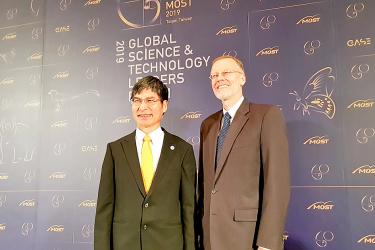The American Institute in Taiwan (AIT) and the French Office in Taipei yesterday expressed their hope to boost ties with Taiwan through technological collaboration and talent cultivation, and both hailed semiconductors and innovation as Taiwan’s strengths.
The two-day Global Science and Technology Leaders Forum, organized by the Ministry of Science and Technology, opened yesterday at the Mandarin Oriental Taipei (文華東方酒店) hotel, and nearly 300 participants from Taiwan and 18 other countries attended.
In a speech, AIT Director Brent Christensen helped mark the ministry’s 60th anniversary, telling the forum that Taiwan is a critical link in global technology supply chains.
Christensen also alerted people to the challenges of the new digital age.
China’s market-distorting subsidies, intellectual property theft and talent poaching threaten a rules-based economic order, he said, calling for closer ties among like-minded partners to push back against Beijing.
The US and Taiwan have launched the Talent Circulation Alliance to facilitate educational and professional exchanges, with a summit scheduled for Tuesday next week, he said.
French Office in Taipei Director Jean-Francois Casabonne-Masonnave said that artificial intelligence (AI), entrepreneurship and talent exchanges are primary opportunities for further France-Taiwan collaboration.
“AI is a priority for our President [Emmanuel Macron] and is a very fertile ground for scientific cooperation between France and Taiwan,” he said, expressing the hope that more Taiwanese students would pursue scientific and engineering training in France.
An example of bilateral collaboration is the Franco-Taiwanese Scientific Grand Prize, which has been awarded annually for more than 20 years, he said, adding that French National Centre for Scientific Research chairman Antoine Petit is expected to visit Taiwan in the spring.
The US remains Taiwan’s primary partner in technological cooperation, and the talent cultivation initiative aims to bring more young people to the international stage, Minister of Science and Technology Chen Liang-gee (陳良基) told reporters.
Taiwan-France collaboration in technology has a history of more than 20 years, while the two nations exchanged six start-up teams this year, Chen said.
The ministry has also established 12 overseas research centers across Southeast Asia, where it is helping countries install disaster prevention systems, he added.
Asked what idea he would share at the forum, Albert Liu (劉峻誠), founder and CEO of Kneron Inc (耐能), one of the developers of Edge AI solutions, said he hopes that the Taiwanese government can relax certain regulations to facilitate AI development.
Many public security and financial systems employ AI, but Taiwan’s relatively conservative regulations in those fields impose barriers on larger-scale innovation, he said, citing the government’s requirement that shareholders provide their identity documents.
Source: Taipei Times - 2019/10/31





















